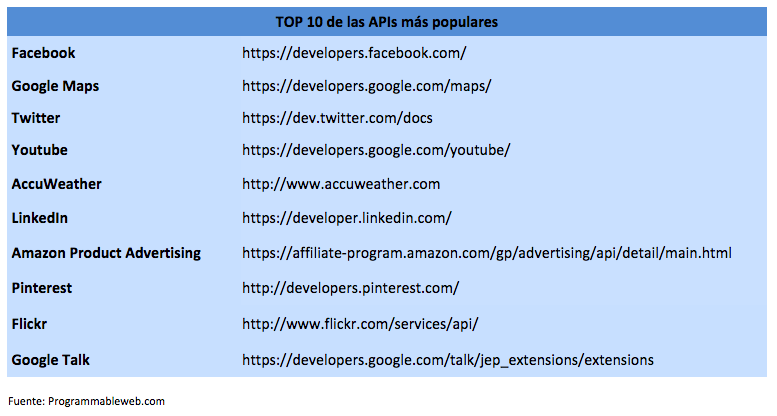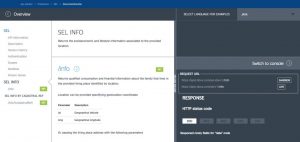Software is today an essential and almost ubiquitous tool in business processes, and application programming interfaces (APIs) are becoming the engine of innovation processes within companies, both internally between departments and externally, creating new services, products and ecosystems for partners and customers.
An API represents the ability to communicate between different software components. In other words, an API is, broadly speaking, the set of functions and procedures that certain software offers in order to be used by other software or program, and this is increasingly the way companies are exchanging data, services and complex resources.
If you‘re not very familiar with the world of APIs, you will surely be surprised to know that among the most popular ones are Facebook, Google Maps and Twitter. Thanks to the APIs developed by its creators, these applications are part of many other applications.
For example, Facebook’s API allows users to create innovative software, thanks to the data made available by the social network (personal profiles, friends, group pages, photos and events.) Thus, this API from Facebook allows developers to add a social character to their applications, based on the network connections and information of the profiles.
With the API from Google Maps developers can create applications that require geographic data. The API allows the incorporation of Google Maps on websites created by external developers using a simple JavaScript or Flash interface. It is designed to work on mobile devices as well as on traditional browser applications. It also offers specific functionalities for those who want to use the API within a company’s intranet, for example.
As it happens with Facebook, Twitter’s API allows developers to access basic user information such as the timeline, status and profile information.
As you can see, an API allows to open data and functionalities to other developers, other companies and even between departments and locations within a company. Therefore, there are as many APIs as companies wanting to make available to other businesses and/or developers their data and content. This is a link to one of the largest repositories of APIs, with more than 12,200 registered.

Benefits for any type of company
In a changing world as the one in which we live today, application programming interfaces offer technology solutions for managing business transformation at different levels and in different business areas. In fact, they are becoming a critical differentiating element in the market, as companies that manage them well will be able to stand-out and be competitive. Why?
The explanation is that APIs essentially provide companies two types of benefits:
– They restructure and organize internal systems to support new innovative projects in a uniform manner, reducing maintenance costs and increasing agility.
– They provide opportunities to create new ways to reach customers, generate revenue and build new alliances with partners.
It should also be noted that nowadays application programming interfaces are no longer limited to large companies. Anyone can detect a business opportunity and, through public APIs, create more accessible, useful and powerful solutions to meet customer expectations more precisely, or even those within the own company. This way, you can simply improve customers’ experience when interacting from a mobile device; open part of your central system so it can be used directly by people outside the company; or open key assets of your company to your partners in order to capture new audiences to which you would never have been able to reach alone.
For developers it is now easier than ever to take advantage of services and third party data to improve their offers, as they can benefit from APIs using their functionalities and avoiding to program everything from scratch.
If you want to try all the potential offered by an API, BBVA has launched the competition InnovaChallenge MX, which awards the most innovative projects created processing massive data. Until 1 December, 2014 you can access the dataset included in the API designed for the contest, which includes commercial business transaction data of clients (anonymously, with aggregated data) in some of Mexico’s main cities in order to create new and innovative applications.
Click here for more information on APIs.



























